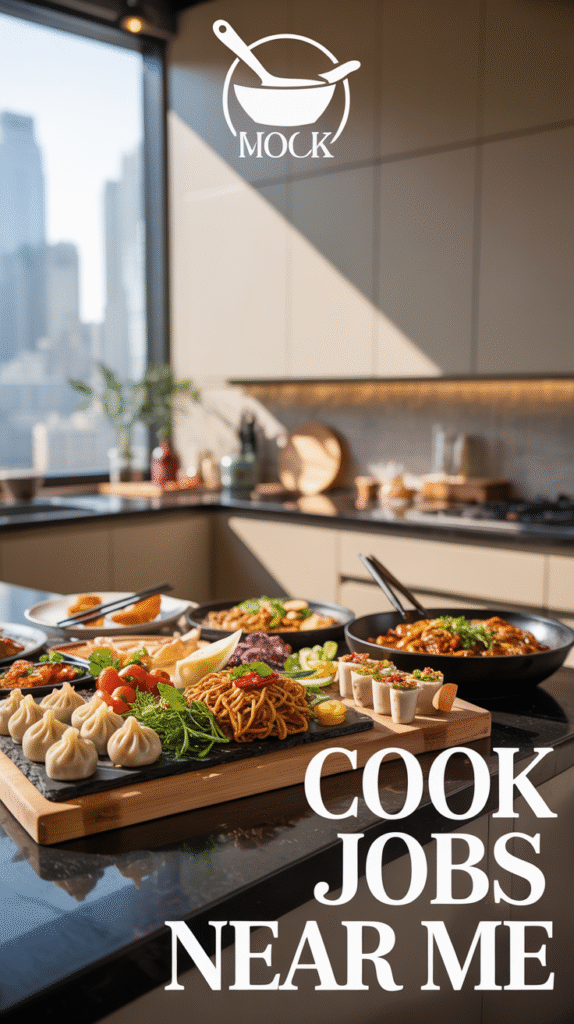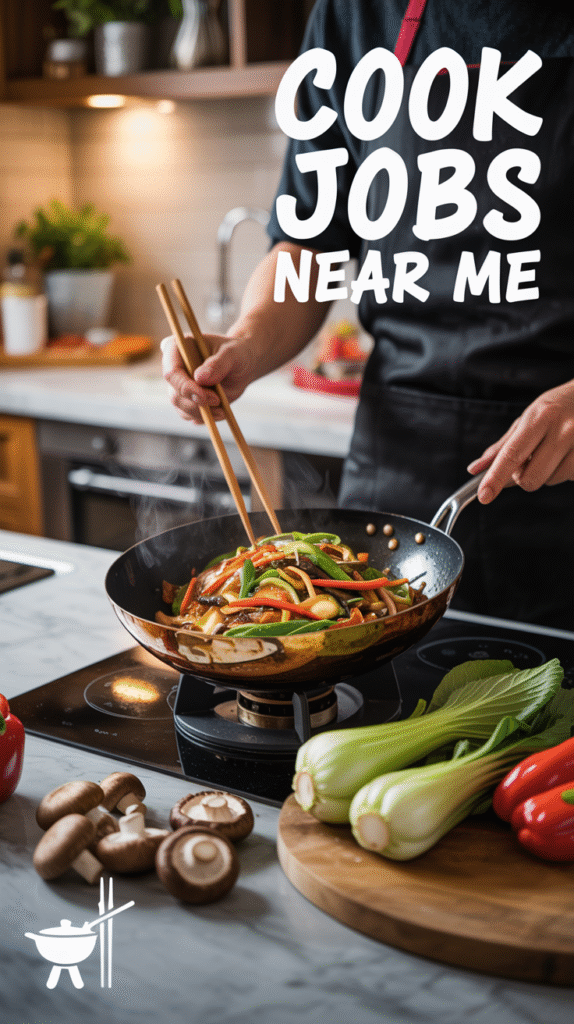If you’re looking for exciting job opportunities in the culinary world, exploring local options is a great starting point. With the rise of food culture, there are numerous “cook jobs near me” that you can consider. From restaurants and cafes to hospitals and schools, the possibilities are plentiful. In this guide, we will dive into effective strategies for uncovering cook jobs in your area, ensuring you find the perfect fit for your skills and interests.
The Benefits of Local Cook Jobs
Working as a cook in your local community offers several advantages:
- Networking: Building connections within your local area can lead to further opportunities.
- Familiar Environment: Knowing your surroundings can make it easier to establish a routine and feel comfortable at work.
- Support Local Businesses: Contributing to your community by working in local establishments helps support the economy.
How to Search for Cook Jobs Near You
Finding cook jobs near you can be easier than it seems. Here are some strategies to consider:
- Online Job Boards: Websites like Indeed and ZipRecruiter allow you to search for specific job titles and filter results based on your location.
- Local Restaurants’ Websites: Many restaurants post job openings directly on their websites. Visit local dining establishments and look for a “Careers” or “Jobs” section.
- Social Media Platforms: Utilize social media channels such as Facebook and LinkedIn, where many businesses list their job openings. Joining community groups can also be helpful.
- Networking: Attending culinary events or engaging with local chefs can lead to job referrals. Don’t underestimate the power of word-of-mouth!
- Job Fairs: Participate in local job fairs focusing on the culinary sector. This hands-on approach allows for direct interaction with hiring managers.
Tailoring Your Resume for Cook Jobs
Your resume is your first impression, so it’s essential to make it count. Here’s how to tailor your resume effectively:
- Highlight Relevant Experience: Focus on cooking roles you’ve held in the past, including your responsibilities and achievements.
- Skills Section: List skills relevant to cooking such as food safety knowledge, knife skills, and familiarity with various cooking techniques.
- Certifications: Include any culinary certifications you have obtained, whether from schools or workshops.
Examples of Cook Jobs Available Nearby
When you search for “cook jobs near me,” you might come across a variety of positions:
| Job Title | Description | Typical Employers |
|---|---|---|
| Line Cook | Prepares food in accordance with recipes and chefs’ instructions. | Restaurants, hotels |
| Prep Cook | Assists in food preparation, including chopping and marinating. | Cafeterias, restaurants |
| Pastry Chef | Focuses on baking and desserts, creating pastries and confections. | Bakeries, high-end restaurants |
| Institutional Cook | Prepares meals in large quantities for institutions such as schools. | Schools, hospitals |
Enhancing Your Skills for Future Opportunities
To stand out among applicants for “cook jobs near me,” consider enhancing your culinary skills. Here are some suggestions:
- Classes and Workshops: Look for local cooking classes or workshops to hone your skills.
- Online Courses: Platforms like Coursera and Udemy offer a range of culinary courses.
- Internships: Look for internship opportunities in reputable restaurants. This provides hands-on experience and can lead to job offers.
Finding cook jobs near you can open up a world of culinary opportunities. By utilizing local resources and enhancing your skills, you can carve out a rewarding career in the culinary field. Embrace the journey of discovery and find the job that resonates with your passion for cooking!
Essential Skills Needed for Success in the Cooking Industry
To thrive in the cooking industry, certain skills are paramount for anyone aiming to excel in a culinary career. Whether you’re a novice hoping to step into the job market or an experienced chef looking to elevate your craft, understanding these essential skills can greatly impact your success.
Technical Skills
Having a strong foundation in technical skills is crucial. These are the hands-on abilities that allow you to create a variety of dishes and menus. Key technical skills include:
- Knife Skills: Proficiency in chopping, dicing, and filleting is essential for efficient food preparation.
- Cooking Techniques: Familiarity with various cooking methods, such as grilling, baking, and sautéing, will enhance your versatility.
- Baking: Understanding the science of baking is vital for pastry chefs and anyone who enjoys creating desserts.
Creativity
Innovation is at the heart of the cooking industry. Displaying creativity in recipe development, presentation, and flavor combinations sets you apart from others. Experimentation with new ingredients and techniques can lead to unique dishes that excite and engage customers.
Attention to Detail
In the kitchen, details matter. From measuring ingredients precisely to ensuring that dishes are plated beautifully, attention to detail is non-negotiable. This skill helps maintain consistency in quality and taste, making it vital in both home and professional kitchens.
Time Management
Time can be your biggest enemy in the cooking industry. Successful cooks can prioritize tasks and manage their time efficiently. Perhaps you’re working in a high-pressure setting with multiple orders. Learning to multitask and stay organized is essential to ensure that food is prepared and served promptly.
Teamwork
The kitchen is often a fast-paced environment where teamwork is critical. Building strong relationships with fellow cooks and kitchen staff fosters collaboration and improves overall productivity. Understanding how to communicate effectively and respecting others’ roles create a harmonious working atmosphere.
Adaptability
The ability to adapt to changes is invaluable. Whether you’re facing a last-minute menu change or an unexpected rush of customers, flexibility allows you to handle the pressure without impacting the quality of your work. Being open to feedback and willing to learn from mistakes also contributes to your growth.
Customer Service Skills
In many culinary roles, especially in restaurants, having excellent customer service skills is crucial. Knowing how to interact pleasantly with clients enhances their dining experience. Listening to feedback and addressing concerns is an important part of building a loyal customer base.
Business Knowledge
Understanding the business side of cooking can be beneficial for those looking to open their own establishments or move up the ladder. Familiarize yourself with aspects such as cost control, inventory management, and menu pricing. This knowledge will help you make informed decisions and improve your overall efficiency.
Continuous Learning
The culinary field is constantly evolving, with new trends and techniques emerging regularly. Successful cooks have a commitment to lifelong learning. This can include attending workshops, taking online courses, and staying updated on industry news. Websites such as Culinary Institute of America offer resources for aspiring chefs to enhance their skills.
Networking
Building connections with other professionals in the culinary field can open doors to new opportunities. Attend industry events, join culinary associations, or participate in community food fairs. Networking not only provides you with valuable resources but also keeps you informed about job openings. Check out Culinary Agents for networking opportunities tailored to the culinary industry.
By honing these essential skills and continuously seeking improvement, you increase your chances of thriving in the competitive cooking industry. Remember that the journey is just as important as the destination; embrace every opportunity to learn and grow.
| Skill | Importance | Ways to Improve |
|---|---|---|
| Knife Skills | Essential for food prep | Practice daily, take classes |
| Time Management | Critical in busy kitchens | Use timers, create prep lists |
| Creativity | Sets dishes apart | Experiment regularly, follow trends |
| Customer Service | Enhances dining experience | Practice communication skills |
In the journey of a culinary career, every skill contributes to your overall success. Focus on developing these essential abilities, and you’ll be well on your way to achieving your dreams in the cooking industry.
The Impact of Culinary Schools on Job Placement Rates
Choosing a career in culinary arts can be an exciting journey for many aspiring chefs and food enthusiasts. Culinary schools have become a vital stepping stone for individuals seeking to enhance their cooking skills and secure stable employment in the industry. One significant aspect of these educational institutions is their impact on job placement rates. Understanding how culinary schools affect the chances of securing cook jobs can help you make informed decisions about your future in the culinary field.
Culinary schools offer a range of programs, including associate degrees, bachelor’s degrees, and certificate courses. These programs typically focus on various cooking techniques, kitchen management, food safety, and nutrition. By providing students with comprehensive training, culinary schools equip them with the skills necessary to excel in a competitive job market.
One of the standout benefits of attending a culinary school is the direct connection to the culinary industry. Many institutions have strong relationships with local restaurants, catering companies, and hotels. This network often results in internships and job placement opportunities that students may not find on their own. This connection can significantly boost job placement rates.
Statistics have shown that graduates of culinary programs tend to have higher job placement rates compared to those without formal training. In fact, according to a survey conducted by the Culinary School Institute, nearly 80% of graduates from accredited culinary programs find employment within six months of completing their courses.
| Type of Program | Job Placement Rate |
|---|---|
| Associate Degree | 75% |
| Bachelor’s Degree | 85% |
| Culinary Certificate | 70% |
Moreover, culinary schools not only provide hands-on experience but also teach students essential soft skills. Communication, teamwork, and time management are crucial in a kitchen environment. Employers often look for candidates who can thrive in a fast-paced setting, and culinary schools emphasize these skills as part of their curriculum. Graduates emerge from these programs not just as skilled cooks but as well-rounded individuals ready to take on the challenges of the culinary world.
Networking opportunities are also a valuable component of culinary education. Many schools organize job fairs and industry events where students can meet potential employers. These events often lead to job offers, further improving placement rates. Additionally, alumni networks provide ongoing support for graduates, allowing them to tap into job leads and career advice long after they’ve left school.
It’s essential to choose a culinary school that suits your career goals. Researching the school’s job placement statistics can provide insight into its efficacy in helping students secure jobs. Consider visiting the school’s website or contacting admissions to inquire about their job placement rates and employer partnerships. Schools that prioritize job placement tend to offer robust career services, including resume workshops and interview preparation.
While culinary schools can significantly impact job placement rates, it’s also crucial for students to actively participate in their own job search. Engaging in internships, volunteer work, and part-time jobs while studying can provide additional experience and connections. These opportunities can make a candidate stand out to potential employers.
In addition to focusing on technical skills, culinary schools encourage creativity and innovation in the kitchen. Many employers value unique culinary voices and original ideas. Graduates who can bring fresh concepts to the table often attract attention in the job market, leading to better job prospects.
It’s important to remember that culinary education is just one piece of the puzzle. Job seekers must also be motivated, willing to learn, and ready to embrace the hard work that comes with a culinary career. For those serious about the industry, the combination of formal education, practical experience, and determination can lead to a fulfilling and successful career in the culinary arts.
If you are considering enrolling in a culinary school, check out resources such as Four Seasons Culinary Training or the American Lifestyle Institute. These institutions not only provide excellent culinary training but also focus on job placement support, helping you to successfully embark on your culinary journey.
Navigating Different Types of Cooking Positions Available
When seeking cook jobs near you, it’s essential to navigate the wide range of cooking positions available. The culinary world offers various opportunities, each with specific responsibilities, skill levels, and environments. Understanding these roles can help you identify a job that suits your interests and experience.
The first step is recognizing the different types of cooking positions in the industry:
- Line Cook: A line cook usually works in a fast-paced kitchen, preparing and plating dishes during service hours. This position often requires the ability to work efficiently and under pressure, as well as a strong understanding of commercial cooking techniques.
- Prep Cook: Prep cooks assist the kitchen by preparing ingredients before the line cooks take over. Their tasks often involve chopping vegetables, marinating meats, and ensuring all components are ready for cooking.
- Sous Chef: The sous chef is the second-in-command in the kitchen. They support the head chef, managing kitchen staff, and overseeing the day-to-day operations. A sous chef must demonstrate leadership skills and a deep knowledge of cooking techniques.
- Executive Chef: The executive chef is responsible for the overall management of the kitchen, including menu creation, inventory control, and staff hiring. This role typically requires extensive culinary training and management experience.
- Pastry Chef: For those who have a sweet tooth, becoming a pastry chef may be appealing. This role focuses on desserts and baked goods. Expertise in baking techniques and creativity in dessert presentation are crucial.
- Private Chef: Working for individuals or families, private chefs create custom menus and prepare meals based on their clients’ preferences and dietary needs. Flexibility and adaptability are important traits for this role.
Another aspect to consider is where these cook jobs near you might be located. Different environments provide varied experiences and cultures:
- Restaurants: The most common setting, restaurants range from fast food to fine dining. Each type has different expectations and cooking styles that may suit your personal interests.
- Catering Companies: If you enjoy variety and planning, working for a catering company can be exciting. This type of role often has you preparing food for specific events and gatherings.
- Hotels and Resorts: Working in a hotel’s kitchen can offer opportunities to learn from experienced chefs while preparing high-volume meals for guests.
Your culinary skill set will largely determine which position best suits your goals, and there are various ways to enhance your qualifications. To increase your chances of landing your desired cook job, consider enrolling in culinary schools or training programs. Institutions like Culinary Institute of America offer comprehensive programs that provide both foundational and advanced culinary skills.
Certification can also make you more attractive to employers. The American Culinary Federation (ACF) provides numerous certifications that can enhance your resume. These credentials display dedication to your craft and may open doors to more advanced positions.
Networking is crucial when searching for cook jobs near you. Attend culinary events, workshops, or food festivals to meet industry professionals. Engaging with like-minded individuals can lead to recommendations and job leads. Additionally, don’t underestimate the power of social media platforms like LinkedIn. Following local restaurants and chefs can provide updates on job openings.
When applying for positions, ensure your resume highlights relevant skills tailored to the specific job requirements. Be prepared to showcase your culinary abilities during interviews, whether through cooking demonstrations or portfolio discussions. Create an online presence by sharing your culinary creations on platforms like Instagram or personal blogs—this can attract potential employers looking for fresh talent.
Moreover, keeping an eye on job boards dedicated to culinary positions can help you find openings quickly. Websites like Hospitality Online and Back of House often list job opportunities specifically in the food industry.
Understanding the various types of cooking positions available and where to find them can significantly enhance your job search efforts. From line cooks to executive chefs, each position requires unique skills and offers different rewards. By enhancing your skills, networking, and utilizing job resources, you’ll be better equipped to secure a fulfilling cook job near you.
Tips for Crafting a Standout Resume for Cooking Jobs
When searching for cook jobs near you, a standout resume can be your ticket to landing an interview. In the culinary world, your resume is not just a list of previous jobs, but a showcase of your skills, creativity, and passion for cooking. Here are some essential tips to help you craft an impressive resume that can grab the attention of hiring managers in the food industry.
Highlight Relevant Culinary Skills
Showcase the specific cooking skills you possess. Employers want to see what you can bring to their kitchen. Include technical skills such as:
- Knife skills
- Proficiency in various cooking techniques (grilling, baking, sautéing)
- Knowledge of food safety and sanitation
- Experience with menu planning
- Ability to work under pressure
Listing these skills clearly can help your resume stand out for cooking jobs near you.
Include Relevant Work Experience
Your work experience should emphasize past culinary positions. If you have worked in different kitchens, be sure to include:
- Your job title
- The name of the establishment
- The dates of your employment
- Key responsibilities and achievements
For instance, if you worked in a high-pressure restaurant, mention how you managed multiple orders at once. This shows your ability to thrive in a busy kitchen environment.
Showcase Your Education and Certifications
Include any relevant education, such as culinary school or workshops that enhance your skills. Certifications can also set you apart. Be sure to list:
- Culinary Art Degree or Diploma
- Food Handler’s Certificate
- ServSafe Certification
- Any additional training or specialized courses
These credentials demonstrate your commitment to the culinary profession and can make a positive impression on potential employers.
Write a Professional Summary
At the top of your resume, include a brief professional summary. This section provides a snapshot of your skills and experiences. You can structure it like this:
“Detail-oriented, passionate culinary professional with over 5 years of experience in fast-paced kitchen environments. Proven ability to create delicious meals while maintaining a clean and organized workspace. Eager to contribute culinary expertise and creativity to a dynamic kitchen team.”
This summary gives hiring managers a quick insight into who you are and what you can bring to their establishment.
Use Action Verbs to Describe Your Experience
When detailing your work experience, use action verbs to make your descriptions more impactful. Words like “prepared,” “constructed,” “developed,” and “collaborated” can add strength to your responsibilities. For example:
- “Prepared fresh ingredients daily to ensure quality and taste.”
- “Collaborated with the team to design weekly special menus.”
- “Trained new staff on kitchen procedures and safety protocols.”
Tailor Your Resume for Each Job Application
Customizing your resume for each position is crucial. Read the job description carefully and identify keywords that reflect the skills and experiences the employer seeks. Use these keywords in your resume to increase your chances of getting noticed. Tailoring shows that you are genuinely interested and have taken the time to align your skills with the job requirements.
Keep it Concise and Visually Appealing
Your resume should be easy to read and visually appealing. Use clear fonts, bullet points for lists, and adequate spacing. Ideally, your resume should not exceed one page, especially if you have less than 10 years of experience. This ensures that hiring managers can quickly see your qualifications without sifting through unnecessary information.
Utilize Online Resources and Job Boards
There are numerous job boards that focus on culinary jobs. Websites like Indeed and Culinary Agents can connect you with openings in your area. Make sure to utilize these resources and submit your tailored resume to increase your chances of landing the cook jobs near you.
Crafting a standout resume is vital in today’s competitive culinary job market. By focusing on relevant skills, experience, and professional presentation, you can create a resume that captures the attention of hiring managers and helps you secure the cook job you desire.
Conclusion
As you embark on your journey to find cook jobs near you, remember that success is about more than just searching for openings. It’s crucial to explore local opportunities that fit your skills and passions. By honing essential culinary skills, you equip yourself with the tools necessary to stand out in a competitive field. Additionally, pursuing education through culinary schools can significantly enhance your job placement prospects, offering valuable training and networking opportunities that can open doors to exciting roles.
With a variety of cooking positions available, from line cooks to pastry chefs, it’s important to identify the right fit for you and tailor your skills accordingly. Understanding the diverse responsibilities of each position helps you make informed choices about where to apply. Crafting a standout resume tailored to the cooking industry is equally vital. Highlighting your culinary experiences, relevant skills, and personal passion will capture the attention of potential employers, increasing your chances of landing interviews.
In the end, finding cook jobs near you is a multifaceted process. It involves careful exploration of local opportunities, continuous skill improvement, and strategic job application efforts. By focusing on these aspects, you can enhance not only your job search experience but also your overall career in the culinary field. Stay determined, keep learning, and let your passion for cooking guide you toward a fulfilling career.







